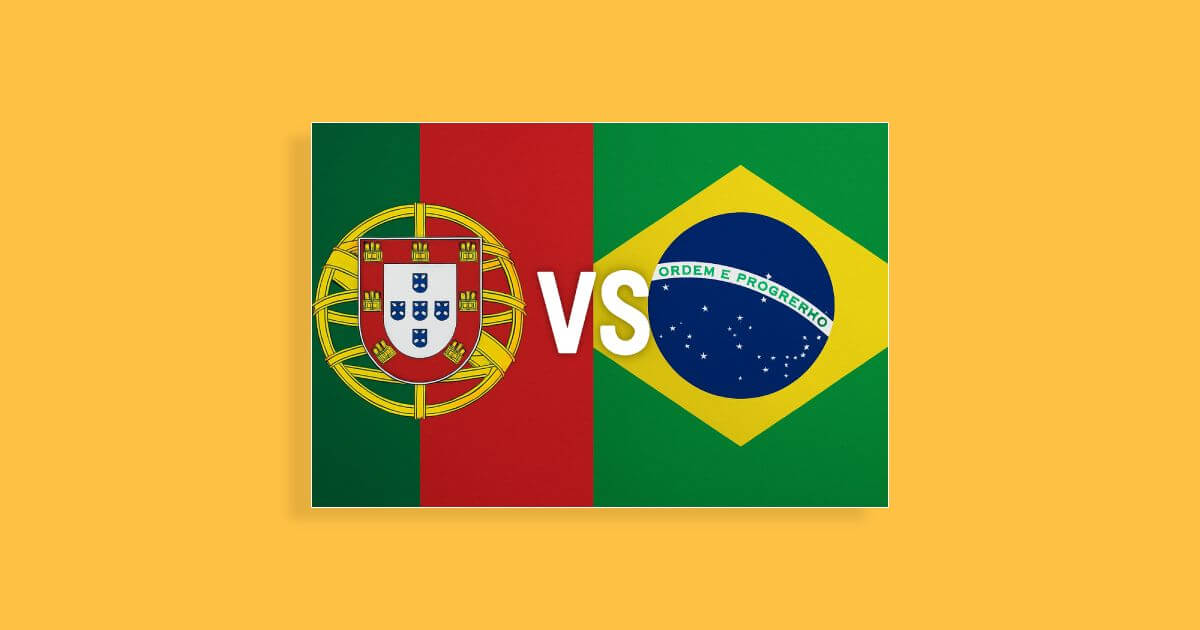If you’re learning Portuguese in Madeira or anywhere else in Portugal, it’s essential to understand the key differences between European Portuguese (spoken in Portugal) and Brazilian Portuguese (spoken in Brazil). Although they share the same roots, they’ve evolved in different directions—much like British vs. American English.
As an online tutor of European Portuguese, I often get asked:
“Can I learn with Brazilian resources if I’m living in Portugal?”
Let’s explore why that might not be the best idea—and what to do instead.
️ 1. Pronunciation: The Most Noticeable Difference
European Portuguese (Portugal)
- Sounds are more closed and muted.
- Many final vowels and syllables are often dropped.
- Rhythm is faster, with stronger contractions.
- Often described as sounding more “mumbled” to beginners.
Example:
“Muito obrigado sounds like “m’t brigad’” in Portugal”.
Brazilian Portuguese
- More open vowels and clearer enunciation.
- Every syllable is usually pronounced.
- More melodic and rhythmic.
Example:
“Muito obrigado sounds like “mooi-toh oh-bree-gah-doh” in Brazil”.
If you’re living or travelling in Madeira, you’ll hear the European accent everywhere. Listening to Brazilian Portuguese may confuse your ear and delay comprehension.
2. Vocabulary Differences
There are many words that differ between the two variants—even for everyday objects:
| English | European Portuguese | Brazilian Portuguese |
|---|---|---|
| Bus | Autocarro | Ônibus |
| Mobile phone | Telemóvel | Celular |
| Ice cream | Gelado | Sorvete |
| Train station | Estação de comboios | Estação de trem |
| Apartment | Apartamento | Apartamento |
Some words are shared but used differently—context matters!
3. Grammar and Formality
European Portuguese:
- Tends to use more formal structures, especially in writing and public interactions.
- Second-person singular (“tu”) is common, but also você in Madeira and southern Portugal.
- Verb conjugations change more noticeably depending on formality and region.
Brazilian Portuguese:
- More informal overall in tone and vocabulary.
- Você is the dominant informal “you” across most of Brazil.
- Verb tenses are often simplified in everyday speech.
Example:
“PT: Tu tens tempo? (Do you have time?)”
“BR: Você tem tempo?“
4. Media and Learning Resources
Unfortunately, most apps, YouTube channels, and online courses default to Brazilian Portuguese. This can be frustrating for learners in Portugal.
Use these resources if you want to focus on European Portuguese:
- PracticePortuguese.com – excellent audio-based site focused on European Portuguese
- Portuguese Lab Podcast – European accent and grammar breakdowns
- RTP Play – watch real Portuguese TV and news from Madeira and beyond
- Portuguese tutors in Italki like myself.
Which One Should You Learn in Madeira?
Short answer: European Portuguese.
You’re in Portugal. Locals in Madeira speak the European variant. If you plan to:
- Live long-term in Madeira
- Apply for residency or citizenship
- Work or study in Portugal
…then learning European Portuguese will serve you best—in pronunciation, vocabulary, and cultural integration.
Frequently Asked Questions
What is the main difference between European and Brazilian Portuguese?
The most noticeable difference is pronunciation. European Portuguese has more muted, contracted sounds, while Brazilian Portuguese uses more open, melodic pronunciation. Vocabulary and grammar also differ.
Can I use Brazilian Portuguese to live in Madeira?
You can get by, but it may confuse locals or make comprehension harder. If you’re living in Madeira, it’s best to focus on European Portuguese to integrate better and understand the local dialect.
Are there different words in European and Brazilian Portuguese?
Yes, many common words differ. For example, “bus” is autocarro in Portugal and ônibus in Brazil. “Mobile phone” is telemóvel in Portugal and celular in Brazil.
Where can I learn European Portuguese online?
Some great resources include PracticePortuguese.com, Portuguese Lab, and RTP Play for local media. You can also take personalized online lessons with a tutor specialized in European Portuguese.
✅ Final Tips from Your Tutor
Don’t mix both dialects when starting—choose one and stick with it.
Immerse yourself in local Portuguese, even if it’s hard to understand at first.
Ask me for European-focused resources—I’ll help guide your study based on where you live or plan to stay.
Don’t worry if you’ve already started with Brazilian content—you can transition gradually.
Need help staying on track?
Get in touch with me for tailored online lessons focused on the European Portuguese spoken in Madeira. Whether you’re just starting or already have a base, I’ll help you sound natural and confident with real-world vocabulary and listening practice.
Learn Portuguese in Madeira: The Ultimate Guide for Expats and Travelers

